莎士比亚十四行诗Sonnetpt
莎士比亚体的十四行诗
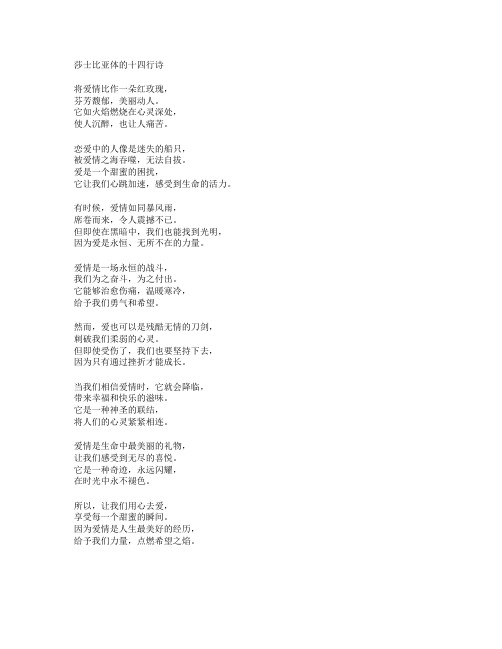
莎士比亚体的十四行诗
将爱情比作一朵红玫瑰,
芬芳馥郁,美丽动人。
它如火焰燃烧在心灵深处,
使人沉醉,也让人痛苦。
恋爱中的人像是迷失的船只,
被爱情之海吞噬,无法自拔。
爱是一个甜蜜的困扰,
它让我们心跳加速,感受到生命的活力。
有时候,爱情如同暴风雨,
席卷而来,令人震撼不已。
但即使在黑暗中,我们也能找到光明,因为爱是永恒、无所不在的力量。
爱情是一场永恒的战斗,
我们为之奋斗,为之付出。
它能够治愈伤痛,温暖寒冷,
给予我们勇气和希望。
然而,爱也可以是残酷无情的刀剑,
刺破我们柔弱的心灵。
但即使受伤了,我们也要坚持下去,
因为只有通过挫折才能成长。
当我们相信爱情时,它就会降临,
带来幸福和快乐的滋味。
它是一种神圣的联结,
将人们的心灵紧紧相连。
爱情是生命中最美丽的礼物,
让我们感受到无尽的喜悦。
它是一种奇迹,永远闪耀,
在时光中永不褪色。
所以,让我们用心去爱,
享受每一个甜蜜的瞬间。
因为爱情是人生最美好的经历,
给予我们力量,点燃希望之焰。
莎士比亚最经典的九首十四行诗,一生至少要读一次!

莎士比亚最经典的九首十四行诗,一生至少要读一次!威廉·莎士比亚,是英国文学史上最杰出的戏剧家,也是欧洲文艺复兴时期最重要、最伟大的作家,全世界最卓越的文学家之一。
莎士比亚流传下来的作品包括39部戏剧、154首十四行诗、两首长叙事诗。
今天就来欣赏下莎士比亚的十四行诗!1. 宁可卑劣宁可卑劣,也不愿负卑劣的虚名,当我们的清白蒙上不白之冤,当正当的娱乐被人妄加恶声,不体察我们的感情,只凭偏见。
为什么别人虚伪淫猥的眼睛有权赞扬或诋毁我活跃的血?专侦伺我的弱点而比我坏的人为什么把我认为善的恣意污蔑?我就是我,他们对于我的诋毁只能够宣扬他们自己的卑鄙:我本方正,他们的视线自不轨;这种坏心眼怎么配把我非议?除非他们固执这糊涂的邪说:恶是人性,统治着世间的是恶。
2. 爱是亘古长明的灯塔我绝不承认两颗真心的结合,会有任何障碍;爱算不得真爱,若是一看见人家改变便转舵,或者一看见人家转弯便离开。
哦,绝不!爱是亘古长明的灯塔,它定睛望着风暴却兀不为动;爱又是指引迷舟的一颗恒星,你可量它多高,它所值却无穷。
爱不受时光的播弄,尽管红颜和皓齿难免遭受时光的毒手;爱并不因瞬息的改变而改变,它巍然矗立直到末日的尽头。
我这话若说错,并被证明不确,就算我没写诗,也没人真爱过。
3. 我怎么能够把你来比作夏天怎么能够把你来比作夏天?你不独比它可爱也比它温婉狂风把五月宠爱的嫩蕊作践,夏天出凭的期限由未免太短天上的眼睛有时照得太酷烈它那炳耀的金颜又常遭掩蔽被机缘或无常的天道所摧折,没有芳艳不终于凋残或销毁但是你的长夏永远不会凋落也不会损失你这皎洁的红芳或死神夸口你在他的影里漂泊当你在不朽的诗里与时同长只要有人类,或人有眼睛,这诗将长存,并赐给你生命。
4. 你的爱怜抹掉那世俗的讥谗你的爱怜抹掉那世俗的讥谗,打在我额上的耻辱的烙印;别人的毁誉对我有什么相干,你既表扬我的善又把恶遮隐!你是我整个宇宙,我必须努力从你的口里听取我的荣和辱;我把别人,别人把我,都当作死,谁能使我的铁心肠变善或变恶?别人的意见我全扔入了深渊,那么干净,我简直像聋蛇一般,凭他奉承或诽谤都充耳不闻。
莎士比亚精选十四行诗

莎士比亚精选十四行诗莎士比亚的诗歌优美浪漫,让人沉醉于优美的文字当中。
下面是店铺为大家带来莎士比亚精选十四行诗,欢迎大家阅读!莎士比亚精选十四行诗1For shame, deny that thou bear'st love to any羞呀,你甭说你还爱着什么人,Who for thyself art so unprovident.既然你对自己只打算坐吃山空。
Grant if thou wilt, thou art beloved of many,好吧,就算你见爱于很多很多人,But that thou none lov'st is most evident;说你不爱任何人却地道天公;For thou art so possessed with murd'rous hate,因为你心中有这种谋杀的毒恨,That 'gainst thyself thou stick'st not to conspire,竟忙着要对你自己图谋不轨,Seeking that beauteous roof to ruinate,渴求着要去摧毁那崇丽的屋顶,Which to repair should be thy chief desire.照理,你应该希望修好它才对。
O, change thy thought, that I may change my mind.你改变想法吧,好教我改变观点!Shall hate be fairer lodged than gentle love?毒恨的居室可以比柔爱的更美?Be as thy presence is, gracious and kind,你应该像外貌一样,内心也和善,Or to thyself at least kind-hearted prove.至少也得对自己多点儿慈悲;Make thee another self for love of me,你爱我,就该去做另一个自身,That beauty still may live in thine or thee.使美在你或你后代身上永存。
莎士比亚十四行诗原文译文探析

莎士比亚十四行诗原文译文探析莎士比亚(William Shakespeare)作为英国文学史上最重要的艺术家之一,其作品一直被世人推崇。
他的十四行诗(sonnet)尤为著名,这些诗歌探讨了爱情、时间、美丽和死亡等永恒的主题。
本文将深入探讨莎士比亚十四行诗的原文及其中文译文,并分析其中蕴含的深刻意义。
首先我们来看莎士比亚的第一首十四行诗,即《莎士比亚十四行诗之一》。
我们首先注意到的是这首诗歌采用了抑扬格的形式,每行由十个音节组成。
莎士比亚通过这种形式的诗歌,表达了对美丽的渴望和对时间流逝的思考。
诗中他说“我们渴望美好的事物能够繁衍,这样美丽之花永不凋谢。
但是随着时光流逝,其越成熟的身影消逝,而他的后代要承载其记忆。
但是你呀,被局限在自己明亮的双眼里,用自我实质的燃料来滋养你的光芒,使得丰富之处变成了匮乏,你是你自己的敌人,对自己太残忍。
”莎士比亚通过这首诗表达了对美丽的追求,以及对个体自我局限的思考。
对于这首诗歌的中文译文,我们可以感受到译者对文章语言美感的运用,使得诗歌在翻译过程中没有失去原有的意境和氛围。
我们可以注意到这首诗歌的表现手法同样采用了抑扬格的形式,每行也由十个音节组成。
诗中莎士比亚表达了对爱人美好容颜的赞美以及对其永恒之美的祝福。
他说:“我要拿你和夏日作比较吗?你比夏天更可爱更温和:狂风能把五月里娇嫩的花蕾摇得摇摆;夏季风光太短促了。
时而天国之眼的光线太过灼热,经常神色黯淡;任何美景都有它的凋残时刻,无论是偶然或是自然因素的干扰。
但是你的永恒夏日永不凋谢,不会失去那属于你的美;死亡也不能夸耀你在他的阴影下徘徊;当你在永恒的诗行里,与时间一同成长,只要人类能喘息,眼睛还能看,你就会永世长存,这首诗也会永存,并为你赋予生命。
”这首诗歌充满了对爱人的赞美和祝福,表达了作者的深情厚爱。
对于这样一首表达深情的诗歌,在翻译的过程中,译者的语言功底和艺术修养显得尤为重要。
他们需要将原文中的美感和情感完整地传递给读者,使读者在欣赏翻译诗歌时能够感受到原诗所传达的深厚意蕴。
莎士比亚十四行诗Sonnet
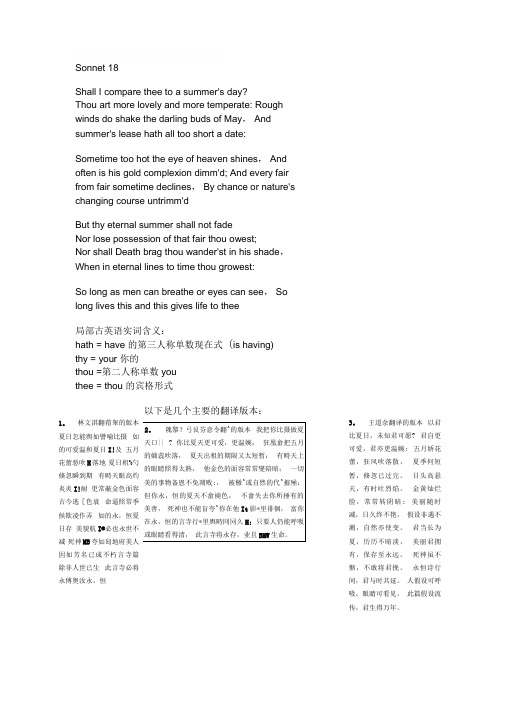
Sonnet 18Shall I compare thee to a summer's day?Thou art more lovely and more temperate: Rough winds do shake the darling buds of May , And summer's lease hath all too short a date:Sometime too hot the eye of heaven shines , And often is his gold complexion dimm'd; And every fair from fair sometime declines , By chance or nature's changing course untrimm'dBut thy eternal summer shall not fadeNor lose possession of that fair thou owest;Nor shall Death brag thou wander'st in his shade , When in eternal lines to time thou growest: So long as men can breathe or eyes can see , So long lives this and this gives life to thee 局部古英语实词含义:hath = have 的第三人称单数现在式 (is having) thy = your 你的thou =第二人称单数you thee = thou 的宾格形式以下是几个主要的翻译版本:2。
隗黎?弓艮芬意令翻^的版本 我把你比摄做夏天口|| ? 你比夏天更可爱,更温婉: 狂凰畲把五月的嫡蕊吹落, 夏天出租的期限又太短暂: 有畤天上的眼睛照得太熟, 他金色的面容常常燮陪暗; 一切美的事物备恩不免凋败:, 被檄^或自然的代^摧殛: 但你永,恒的夏天不畲褪色, 不畲失去你所捶有的美善, 死神也不能盲夸^你在他It 影*里徘徊, 富你在永,恒的言寺行*里舆畤冏同久H: 只要人仍能呼吸或眼睛看得清, 此言寺将永存,业且BMW 生命。
莎士比亚经典十四行诗英文翻译
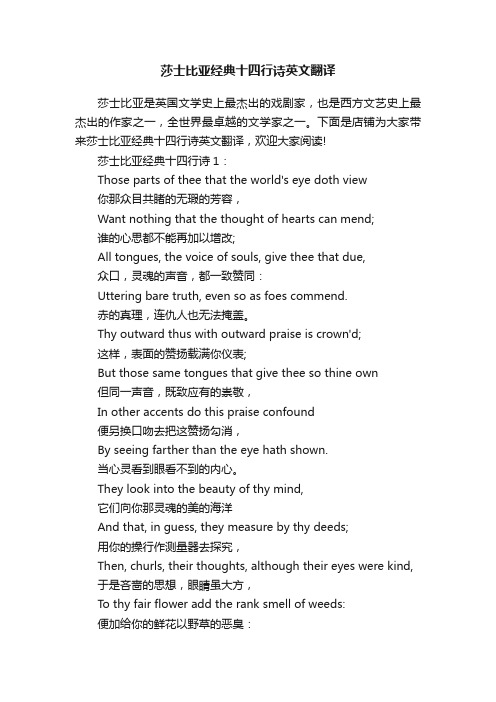
莎士比亚经典十四行诗英文翻译莎士比亚是英国文学史上最杰出的戏剧家,也是西方文艺史上最杰出的作家之一,全世界最卓越的文学家之一。
下面是店铺为大家带来莎士比亚经典十四行诗英文翻译,欢迎大家阅读!莎士比亚经典十四行诗1:Those parts of thee that the world's eye doth view你那众目共睹的无瑕的芳容,Want nothing that the thought of hearts can mend;谁的心思都不能再加以增改;All tongues, the voice of souls, give thee that due,众口,灵魂的声音,都一致赞同:Uttering bare truth, even so as foes commend.赤的真理,连仇人也无法掩盖。
Thy outward thus with outward praise is crown'd;这样,表面的赞扬载满你仪表;But those same tongues that give thee so thine own但同一声音,既致应有的崇敬,In other accents do this praise confound便另换口吻去把这赞扬勾消,By seeing farther than the eye hath shown.当心灵看到眼看不到的内心。
They look into the beauty of thy mind,它们向你那灵魂的美的海洋And that, in guess, they measure by thy deeds;用你的操行作测量器去探究,Then, churls, their thoughts, although their eyes were kind, 于是吝啬的思想,眼睛虽大方,To thy fair flower add the rank smell of weeds:便加给你的鲜花以野草的恶臭:But why thy odour matcheth not thy show,为什么你的香味赶不上外观?The solve is this, that thou dost common grow. 土壤是这样,你自然长得平凡。
莎翁十四行诗译文翻译美文阅读

莎翁十四行诗译文翻译美文阅读莎士比亚十四行诗集,是歌颂友情和爱情的最美抒情诗。
今天店铺在这里为大家分享一些莎翁十四行诗的译文,欢迎大家阅读!莎翁十四行诗译文篇1Sin of self-love possesseth all mine eye自爱这罪恶占据着我的眼睛,And all my soul and all my every part;我整个的灵魂和我身体各部;And for this sin there is no remedy,而对这罪恶什么药石都无灵,It is so grounded inward in my heart.在我心内扎根扎得那么深固。
Methinks no face so gracious is as mine,我相信我自己的眉目最秀丽,No shape so true, no truth of such account;态度最率真,胸怀又那么俊伟;And for myself mine own worth do define,我的优点对我这样估计自己:As I all other in all worths surmount.不管哪一方面我都出类拔萃。
But when my glass shows me myself indeed,但当我的镜子照出我的真相,Beated and chopp'd with tann'd antiquity,全被那焦黑的老年剁得稀烂,Mine own self-love quite contrary I read;我对于自爱又有相反的感想:Self so self-loving were iniquity.这样溺爱着自己实在是罪愆。
'Tis thee, myself, that for myself I praise,我歌颂自己就等于把你歌颂,Painting my age with beauty of thy days.用你的青春来粉刷我的隆冬。
莎士比亚十四行诗
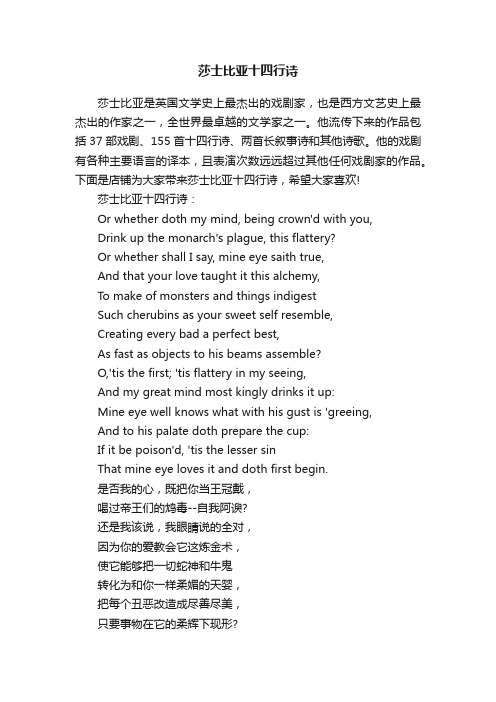
莎士比亚十四行诗莎士比亚是英国文学史上最杰出的戏剧家,也是西方文艺史上最杰出的作家之一,全世界最卓越的文学家之一。
他流传下来的作品包括37部戏剧、155首十四行诗、两首长叙事诗和其他诗歌。
他的戏剧有各种主要语言的译本,且表演次数远远超过其他任何戏剧家的作品。
下面是店铺为大家带来莎士比亚十四行诗,希望大家喜欢!莎士比亚十四行诗:Or whether doth my mind, being crown'd with you,Drink up the monarch's plague, this flattery?Or whether shall I say, mine eye saith true,And that your love taught it this alchemy,To make of monsters and things indigestSuch cherubins as your sweet self resemble,Creating every bad a perfect best,As fast as objects to his beams assemble?O,'tis the first; 'tis flattery in my seeing,And my great mind most kingly drinks it up:Mine eye well knows what with his gust is 'greeing,And to his palate doth prepare the cup:If it be poison'd, 'tis the lesser sinThat mine eye loves it and doth first begin.是否我的心,既把你当王冠戴,喝过帝王们的鸩毒--自我阿谀?还是我该说,我眼睛说的全对,因为你的爱教会它这炼金术,使它能够把一切蛇神和牛鬼转化为和你一样柔媚的天婴,把每个丑恶改造成尽善尽美,只要事物在它的柔辉下现形?哦,是前者;是眼睛的自我陶醉,我伟大的心灵把它一口喝尽:眼睛晓得投合我心灵的口味,为它准备好这杯可口的毒饮。
莎士比亚十四行诗原文译文探析
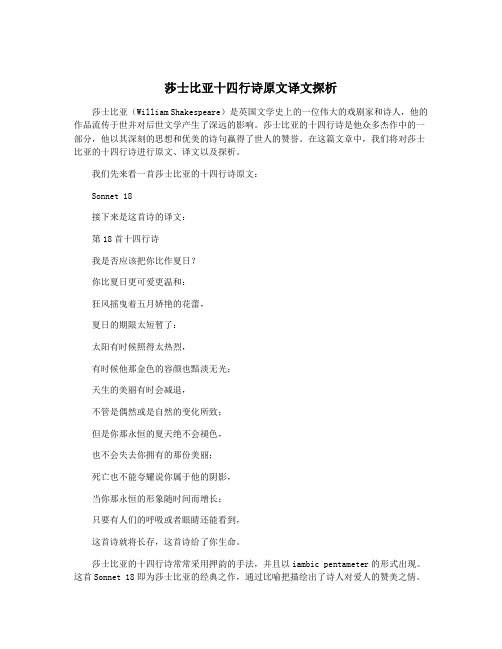
莎士比亚十四行诗原文译文探析莎士比亚(William Shakespeare)是英国文学史上的一位伟大的戏剧家和诗人,他的作品流传于世并对后世文学产生了深远的影响。
莎士比亚的十四行诗是他众多杰作中的一部分,他以其深刻的思想和优美的诗句赢得了世人的赞誉。
在这篇文章中,我们将对莎士比亚的十四行诗进行原文、译文以及探析。
我们先来看一首莎士比亚的十四行诗原文:Sonnet 18接下来是这首诗的译文:第18首十四行诗我是否应该把你比作夏日?你比夏日更可爱更温和:狂风摇曳着五月娇艳的花蕾,夏日的期限太短暂了:太阳有时候照得太热烈,有时候他那金色的容颜也黯淡无光;天生的美丽有时会减退,不管是偶然或是自然的变化所致;但是你那永恒的夏天绝不会褪色,也不会失去你拥有的那份美丽;死亡也不能夸耀说你属于他的阴影,当你那永恒的形象随时间而增长;只要有人们的呼吸或者眼睛还能看到,这首诗就将长存,这首诗给了你生命。
莎士比亚的十四行诗常常采用押韵的手法,并且以iambic pentameter的形式出现。
这首Sonnet 18即为莎士比亚的经典之作,通过比喻把描绘出了诗人对爱人的赞美之情。
诗的开篇即以修辞设问来呈现,作者在问自己是否应该将心上人比作夏日,然后通过下文的赞美,表达出对心上人更为深切的赞美之情。
他认为心上人的美丽胜过夏日,夏日虽然美丽,却不如心上人温和可爱。
由此,诗中呈现了作者对心上人的赞美之情。
在诗的后半部分,诗人使用了“永恒的夏天”来包含对心上人的赞美之语,不管是风吹雨打,都不会改变。
随后,诗人再以修辞手法呼唤死亡无法摧毁对心上人的赞美之情,并肯定了这份美丽将长存与时间,给了心上人永生。
通过以上对原文和译文的对比分析,我们不难发现莎士比亚的十四行诗所蕴含的深刻情感。
诗人通过对夏日和心上人的比较,抒发了对心上人深切的赞美之情,并以永恒的夏天来喻示继续深切的情感长存。
这首诗也正是莎士比亚情感抒发的一个缩影,其深情款款的语言和艺术手法让我们感受到了莎士比亚伟大的文学魅力。
莎士比亚诗选-十四行诗

莎士比亚诗选-十四行诗十四行诗献给下面刊行的十四行诗的唯一的促成者W.H.先生祝他享有一切幸运,并希望我们的永生的诗人所预示的不朽得以实现。
对他怀着好意并断然予以出版的T.T.一对天生的尤物我们要求蕃盛,以便美的玫瑰永远不会枯死,但开透的花朵既要及时雕零,就应把记忆交给娇嫩的后嗣;但你,只和你自己的明眸定情,把自己当燃料喂养眼中的火焰,和自己作对,待自己未免太狠,把一片丰沃的土地变成荒田。
你现在是大地的清新的点缀,又是锦绣阳春的唯一的前锋,为什么把富源葬送在嫩蕊里,温柔的鄙夫,要吝啬,反而浪用?可怜这个世界吧,要不然,贪夫,就吞噬世界的份,由你和坟墓。
当四十个围攻你的朱颜,在你美的园地挖下深的战壕,你青春的华服,那么被人艳羡,将成褴褛的败絮,谁也不要瞧:那时人若问起你的美在何处,哪里是你那少壮年华的宝藏,你说,“在我这双深陷的眼眶里,是贪婪的羞耻,和无益的颂扬。
” 你的美的用途会更值得赞美,如果你能够说,“我这宁馨小童将总结我的账,宽恕我的老迈,” 证实他的美在继承你的血统!这将使你在衰老的暮年更生,并使你垂冷的血液感到重温。
三照照镜子,告诉你那镜中的脸庞,说现在这庞儿应该另造一副;如果你不赶快为它重修殿堂,就欺骗世界,剥掉母亲的幸福。
因为哪里会有女人那么淑贞她那处女的胎不愿被你耕种?哪里有男人那么蠢,他竟甘心做自己的坟墓,绝自己的血统?你是你母亲的镜子,在你里面她唤回她的盛年的芳菲四月:同样,从你暮年的窗你将眺见——纵皱纹满脸——你这黄金的岁月。
但是你活着若不愿被人惦记,就独自死去,你的肖像和你一起。
俊俏的浪子,为什么把你那份美的遗产在你自己身上耗尽?造化的馈赠非赐予,她只出赁;她慷慨,只赁给宽宏大量的人。
那么,美丽的鄙夫,为什么滥用那交给你转交给别人的厚礼?赔本的高利贷者,为什么浪用那么一笔大款,还不能过日子?因为你既然只和自己做买卖,就等于欺骗你那妩媚的自我。
这样,你将拿什么账目去交代,当造化唤你回到她怀里长卧?你未用过的美将同你进坟墓;用呢,就活着去执行你的遗嘱。
莎士比亚十四行诗(第1-40首)_英文原著_外语学习资料
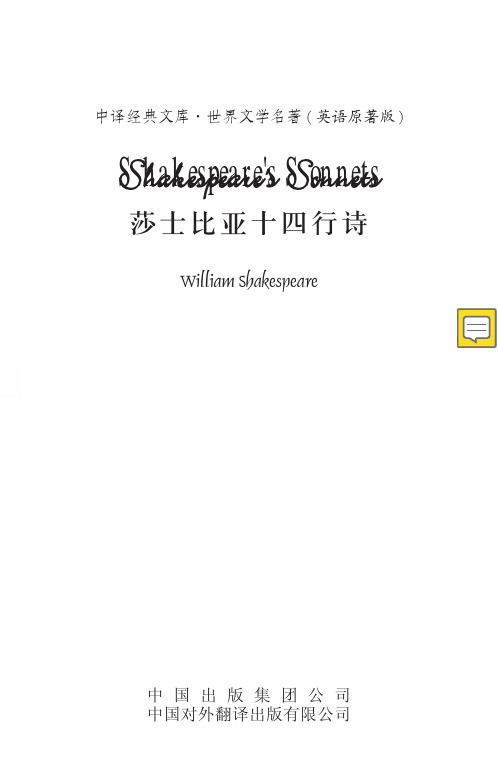
᱑㭍Ⱒ㲧㬌㧞➺㬸᷍⤜。䔗㬌䄓。䅘᱒᷍厶䈐䁈㻑㧈⪬᷍㶃䈐 䁈㻑䇩㡅㧈⪬᱄䄋㼌⧚⭸䁈大䄜䐷䈐䁵᷍⡹㿌䇱⫔㑠⭥䊥Ⱒ᱄䎃 ⤜㆗㋪䄵㭍㚽㪛㣪⭹䍧㸶㡅䈐䁵ゝ㚽᷍䄓㋪㑬ㆃ䄜䐷䈐䁵㰚⧱䊹 ⭥Ⱑ㲹㸥鼻᱄᱑䐱䅌㈎⮅㸥㌃·㬡ㆈ㸥䁈㘜䑙 䇃䈐䊎䑙⟇ ᱒kespeare's Sonnets
1
1
F rom fairest creatures we desire increase, That thereby beauty’s rose might never die,
But as the riper should by time decease,
China Translation and Publishing Corporation (CTPC), with a publishing mission oriented toward readings of Chinese and foreign languages learning as well as cultural exchange, has been dedicated to providing spiritual feasts which not only optimize language aptitude but also nourish heart and soul. Along with the development of Internet and digital publication, readers have easier access to reading classic works. Nevertheless, well-designed printed books remain favorite readings for most readers.
SONNET莎士比亚十四行诗全文
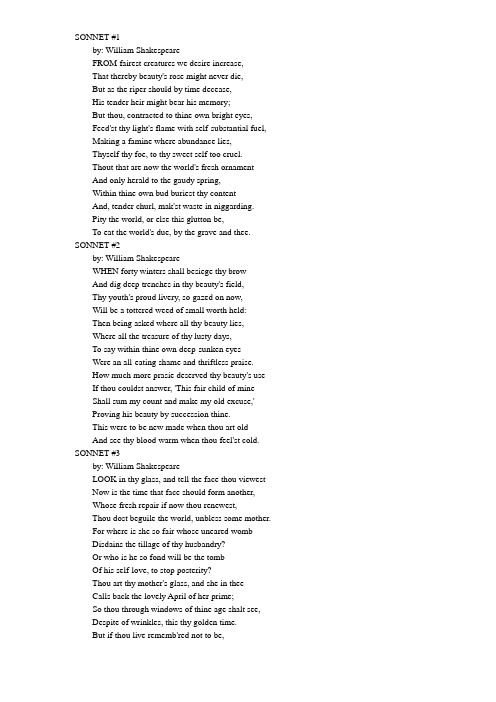
SONNET #1by: William ShakespeareFROM fairest creatures we desire increase,That thereby beauty's rose might never die,But as the riper should by time decease,His tender heir might bear his memory;But thou, contracted to thine own bright eyes,Feed'st thy light's flame with self-substantial fuel,Making a famine where abundance lies,Thyself thy foe, to thy sweet self too cruel.Thout that are now the world's fresh ornamentAnd only herald to the gaudy spring,Within thine own bud buriest thy contentAnd, tender churl, mak'st waste in niggarding.Pity the world, or else this glutton be,To eat the world's due, by the grave and thee. SONNET #2by: William ShakespeareWHEN forty winters shall besiege thy browAnd dig deep trenches in thy beauty's field,Thy youth's proud livery, so gazed on now,Will be a tottered weed of small worth held:Then being asked where all thy beauty lies,Where all the treasure of thy lusty days,To say within thine own deep-sunken eyesWere an all-eating shame and thriftless praise.How much more prasie deserved thy beauty's useIf thou couldst answer, 'This fair child of mineShall sum my count and make my old excuse,'Proving his beauty by succession thine.This were to be new made when thou art oldAnd see thy blood warm when thou feel'st cold. SONNET #3by: William ShakespeareLOOK in thy glass, and tell the face thou viewestNow is the time that face should form another,Whose fresh repair if now thou renewest,Thou dost beguile the world, unbless some mother.For where is she so fair whose uneared wombDisdains the tillage of thy husbandry?Or who is he so fond will be the tombOf his self-love, to stop posterity?Thou art thy mother's glass, and she in theeCalls back the lovely April of her prime;So thou through windows of thine age shalt see,Despite of wrinkles, this thy golden time.But if thou live rememb'red not to be,Die single, and thine image dies with thee. SONNET #4by: William ShakespeareUNTHRIFTY loveliness, why dost thou spendUpon thyself they beauty's legacy?Nature's bequest gives nothing but doth lend,And, being frank, she lends to those are free.Then, beateous niggard, why dost thou abuseThe bounteous largess given thee to give?Profitless userer, why dost thou useSo great a sum of sums, yet canst not live?For, having traffic with thyself alone,Thou of thyself thy sweet self dost deceive:Then how, when Nature calls thee to be gone,What acceptable audit canst thou leave?Thy unused beauty must be tombed with thee,Which, usèd, lives th' executor to be.SONNET #5by: William ShakespeareTHOSE hours that with gentle work did frameThe lovely gaze where every eye doth dwellWill play the tyrants to the very sameAnd that unfair which fairly doth excel;For never-resting time leads summer onTo hideous winter and confounds him there,Sap checked with frost and lusty leaves quite gone,Beauty o'ersnowed and bareness everywhere.Then, were not summer's distillation leftA liquid prisoner pent in walls of glass,Beauty's effect with beauty were bereft,Nor it nor no remembrance what it was:But flowers distilled, though they with winter meet,Leese but there snow; their substance still lives sweet. SONNET #6by: William ShakespeareTHEN let not winter's ragged hand defaceIn thee thy summer ere thou be distilled:Make sweet some vial; treasure thou some placeWith beauty's treasure ere it be self-killed.That use is not forbidden usuryWhich happies those that pay the willing loan;That's for thyself to breed another thee,Or ten times happier be it ten for one.Ten times thyself were happier than thou art,If ten of thine ten times refigured thee:Then what could death do if thou shouldst depart,Leaving thee living in posterity?Be not self-willed, for thou art much too fairTo be death's conquest and make worms thine heir. SONNET #7by: William ShakespeareLO, in the orient when the gracious lightLifts up his burning head, each under eyeDoth homage to his new-appearing sight,Serving with looks his sacred majesty;And having climbed the steep-up heavenly hill,Resembling strong yough in his middle age,Yet mortal looks adore his beauty still,Attending on his golden pilgrimage;But when from highmost pitch, with weary car,Like feeble age he reeleth from the day,The eyes, fore duteous, now converted areFrom his low tract and look another way:So thou, thyself outgoing in thy noon,Unlooked on diest unless thou get a son. SONNET #8by: William ShakespeareMUSIC to hear, why hear'st thou music sadly?Sweets with sweets war not, joy delights in joy:Why lov'st thou that which thou receiv'st not gladly, Or else receiv'st with pleasure thine annoy?If the true concord of well-tunèd sounds,By unions married, do offend thine ear,They do but sweetly chide thee, who confoundsIn singleness the parts that thou shouldst bear.Mark how one string, sweet husband to another,Strikes each in each by mutual ordering;Resembling sire and child and happy mother,Who, all in one, one pleasing note do sing;Whose speechless song, being many, seeming one,Sings this to thee, 'Thou single wilt prove none.' SONNET #9by: William ShakespeareIS it for fear to wet a widow's eyeThat thou consum'st thyself in single life?Ah, if thou issueless shalt hap to die,The world will wail thee like a makeless wife;The world will be thy widow, and still weepThat thou no form of thee hast left behind,When every private widow well may keep,By children's eyes, her husband's shape in mind.Look what an unthrift in the world doth spendShifts but his place, for still the world enjoys it;But beauty's waste hath in the world an end,And, kept unused, the user so destroys it:No love toward others in that bosom sitsThan on himself such murd'rous shame commits SONNET #10by: William ShakespeareFOR shame, deny that thou bear'st love to anyWho for thyself art so unprovident:Grant, if thou wilt, thou art beloved of many,But that thou none lov'st is most evident;For thou art so possessed with murd'rous hateThat 'gainst thyself thou stick'st not to conspire,Seeking that beauteous roof to ruinateWhich to repair should be thy chief desire.O, change thy thought, that I may change my mind;Shall hate be fairer lodged than gentle love?Be as thy presence is, gracious and kind,Or to thyself at least kind-hearted prove:Make thee another self for love of me,That beauty still may live in thine or thee.SONNET #11by: William ShakespeareAS fast as thou shalt wane, so fast thou grow'stIn one of thine, from that which thou departest;And that fresh blood which youngly thou bestow'stThou mayst call thine when thou from youth convertest.Herein lives wisdom, beauty, and increase;Without this, folly, age, and cold decay.If all were minded so, the times should cease,And threescore year would make the world away.Let those whom Nature hath not made for store,Harsh, featureless, and rude, barrenly perish:Look whom she best endowed she gave the more,Which bounteous gift thou shouldst in bounty cherish.She carved thee for her seal, and meant therebyThou shouldst print more, not let that copy die. SONNET #12by: William ShakespeareWHEN I do count the clock that tells the timeAnd see the brave day sunk in hideous night,When I behold the violet past primeAnd sable curls all silvered o'er with white,When lofty trees I see barren of leaves,Which erst from heat did canopy the herd,And summer's green all girded up in sheavesBorne on the bier with white and bristly beard;Then of thy beauty do I question makeThat thou among the wastes of time must go,Since sweets and beauties do themselves forsakeAnd die as fast as they see others grow;And nothing 'gainst Time's scythe can make defense Save breed, to brave him when he takes thee hence. SONNET #13by: William ShakespeareO , THAT you were yourself, but, love, you areNo longer yours than you yourself here live:Against this coming end you should prepare,And your sweet semblance to some other give.So should that beauty which you hold in leaseFind no determination; then you wereYourself again after yourself's deceaseWhen your sweet issue your sweet form should bear.Who lets so fair a house fall to decay,Which husbandry in honor might upholdAgainst the stormy gusts of winter's dayAnd barren rage of death's eternal cold?O, none but unthrifts! Dear my love, you knowYou had a father -- let your son say so.SONNET #14by: William ShakespeareNOT from the stars do I my judgment pluck,And yet methinks I have astronomy;But not to tell of good or evil luck,Of plagues, of dearths, or season's quality;Nor can I fortune to brief minutes tell,Pointing to each his thunder, rain, and wind,Or say with princes if it shall go wellBy oft predict that I in heaven find;But from thine eyes my knowledge I derive,And, constant stars, in them I read such artAs truth and beauty shall together thriveIf from thyself to store thou wouldst convert:Or else of thee this I prognosticate,Thy end is truth's and beauty's doom and date. SONNET #15by: William ShakespeareWHEN I consider everything that growsHolds in perfection but a little moment,That this huge stage presenteth nought but showsWhereon the stars in secret influence comment;When I perceive that men as plants increase,Cheerèd and checked even by the selfsame sky,V aunt in their youthful sap, at height decrease,And wear their brave state out of memory:Then the conceit of this inconstant staySets you most rich in youth before my sight,Where wasteful Time debateth with DecayTo change your day of youth to sullied night;And, all in war with Time for love of you,As he takes from you, I ingraft you new.SONNET #16by: William ShakespeareBUT wherefore do not you a mightier wayMake war upon this bloody tyrant, Time?And fortify yourself in your decayWith means more blessèd than my barren rime?Now stand you on the top of happy hours,And many maiden gardens, yet unset,With virtuous wish would bear your living flowers,Much liker than your painted counterfeit:So should the lines of life that life repairWhich this time's pencil or my pupil pen,Neither in inward worth nor outward fairCan make you live yourself in eyes of men.To give away yourself keeps yourself still,And you must live, drawn by your own sweet skill."Sonnet #16" was originally published in Shake-speares Sonnets: Never before Imprinted (1609).SONNET #17by: William ShakespeareHO will believe my verse in time to comeIf it were filled with your most high deserts?Though yet, heaven knows, it is but as a tombWhich hides your life and shows not half your parts.If I could write the beauty of your eyesAnd in fresh numbers number all your graces,The age to come would say, 'This poet lies--Such heavenly touches ne'er touched earthly faces.'So should my papers, yellowed with their age,Be scorned, like old men of less truth than tongue,And your true rights be termed a poet's rageAnd stretchèd metre of an antique song.But were some child of yours alive that time,You should live twice--in it and in my rime."Sonnet #17" was originally published in Shake-speares Sonnets: Never before Imprinted (1609).SONNET #18by: William ShakespeareShall I compare thee to a summer's day?Thou art more lovely and more temperate.Rough winds do shake the darling buds of May,And summer's lease hath all too short a date.Sometime too hot the eye of heaven shines,And often is his gold complexion dimmed;And every fair from fair sometime declines,By chance, or nature's changing course, untrimmed:But thy eternal summer shall not fadeNor lose possession of that fair thou ow'st,Nor shall Death brag thou wand'rest in his shadeWhen in eternal lines to time thou grow'st.So long as men can breathe or eyes can see,So long lives this, and this gives life to thee."Sonnet #18" was originally published in Shake-speares Sonnets: Never before Imprinted (1609).SONNET #19by: William ShakespeareDevouring time, blunt thou the lion's paws,And make the earth devour her own sweet brood;Pluck the keen teeth from the fierce tiger's jaws,And burn the long-lived phoenix in her blood;Make glad and sorry seasons as they fleet'st,And do whate'er thou wilt, swift-footed Time,To the wide world and all her fading sweets,But I forbid thee one most heinous crime:O, carve not with thy hours my love's fair brow,Nor draw no lines there with thine antique pen;Him in thy course untainted do allowFor beauty's pattern to succeeding men.Yet do thy worst, old Time: despite thy wrong,My love shall in my verse ever live young."Sonnet #19" was originally published in Shake-speares Sonnets: Never before Imprinted (1609).SONNET #20by: William Shakespeare (1564-1616)WOMAN'S face, with Nature's own hand painted,Hast thou, the master-mistress of my passion;A woman's gentle heart, but not acquaintedWith shifting change, as is false women's fashion;An eye more bright than theirs, less false in rolling,Gilding the object whereupon it gazeth;A man in hue all hues in his controlling,Which steals men's eyes and women's souls amazeth.And for a woman wert thou first created,Till Nature as she wrought thee fell a-doting,And by addition me of thee defeatedBy adding one thing to my purpose nothing.But since she pricked thee out for women's pleasure,Mine be thy love, and thy love's use their treasure."Sonnet #20" was originally published in Shake-speares Sonnets: Never before Imprinted(1609).SONNET #21by: William Shakespeare (1564-1616)O is it not with me as with that MuseStirred by a painted beauty to his verse,Who heaven itself for ornament doth useAnd every fair with his fair doth rehearse;Making a couplement of proud compareWith sun and moon, with earth and sea's rich gems,With April's first-born flowers, and all things rareThat heaven's airs in this huge rondure hems.O let me, true in love, but truly write,And then believe me, my love is as fairAs any mother's child, though not so brightAs those gold candles fixed in heaven's air:Let them say more that like of hearsay well;I will not praise that purpose not to sell."Sonnet #21" was originally published in Shake-speares Sonnets: Never before Imprinted (1609).SONNET #22by: William Shakespeare (1564-1616)MY glass shall not persuade me I am oldSo long as youth and thou are of one date;But when in thee time's furrows I behold,Then look I death my days should expiate.For all that beauty that doth cover theeIs but the seemly raiment of my heart,Which in they breast doth live, as thine in me:How can I then be elder than thou art?O therefore, love, be of thyself so waryAs I, not for myself, but for thee will,Bearing thy heart, which I will keep so charyAs tender nurse her babe from faring ill.Presume not on thy heart when mine is slain;Thou gav'st me thine not to give back again."Sonnet #22" was originally published in Shake-speares Sonnets: Never before Imprinted (1609).SONNET #23by: William Shakespeare (1564-1616)AS an unperfect actor on the stage,Who with his fear is put besides his part,Or some fierce thing replete with too much rage,Whose strength's abundance weakens his own heart;So I, for fear of trust, forget to sayThe perfect ceremony of love's rite,And in mine own love's strength seem to decay,O'ercharged with burden of mine own love's might.O, let my books be then the eloquenceAnd dump presagers of my speaking breast,Who plead for love, and look for recompense,More than that tongue that more hath more expressed.O, learn to read what silent love hath writ:To hear with eyes belongs to love's fine wit."Sonnet #23" was originally published in Shake-speares Sonnets: Never before Imprinted (1609).SONNET #24by: William Shakespeare (1564-1616)MINE eye hath played the painter and hath stelledThy beauty's form in table of my heart;My body is the frame wherein 'tis held,And perspective it is best painter's art.For through the painter must you see his skillTo fine where your true image pictured lies,Which in my bosom's shop is hanging still,That hath his windows glazèd with thine eyes.Now see what good turns eyes for eyes have done:Mine eyes have drawn thy shape, and thine for meAre windows to my breast, wherethrough the sunDelights to peep, to gaze therein on thee.Yet eyes this cunning want to grace their art;They draw but what they see, know not the heart."Sonnet #24" was originally published in Shake-speares Sonnets: Never before Imprinted (1609).SONNET #25by: William Shakespeare (1564-1616)LET those who are in favor with their starsOf public honor and proud titles boast,Whilst I, whom fortune of such triumph bars,Unlooked for joy in that I honor most.Great princes' favorites their fair leaves spreadBut as the marigold at the sun's eye;And in themselves their pride lies burièd,For at a frown they in their glory die.The painful warrior famousèd for fight,After a thousand victories once foiled,Is from the book of honor rasèd quite,And all the rest forgot for which he toiled.Then happy I, that love and am belovedWhere I may not remove nor be removed."Sonnet #25" was originally published in Shake-speares Sonnets: Never before Imprinted (1609).SONNET #26by: William Shakespeare (1564-1616)LORD of my love, to whom in vassalageThy merit hath my duty strongly knit,To thee I send this written ambassageTo witness duty, not to show my wit;Duty so great, which wit so poor as mineMay make seem bare, in wanting words to show it,But that I hope some good coneit of thineIn thy soul's thought, all naked, will bestow it;Till whatsoever star that guides my movingPoints on me graciously with fair aspect,And puts apparel on my tottered lovingTo show me worthy of thy sweet respect:Then may I dare to boast how I do love thee;Till then not show my head where thou mayest prove me."Sonnet #26" was originally published in Shake-speares Sonnets: Never before Imprinted (1609).SONNET #27by: William Shakespeare (1564-1616)WEARY with toil, I haste to my bed,The dear repose for limbs with travel tired,But then begins a journey in my headTo work my mind when body's work's expired;For then my thoughts, from far where I abide,Intend a zealous pilgrimage to thee,And keep my drooping eyelids open wide,Looking on darkness which the blind do see;Save that my soul's imaginary sightPresents thy shadow to my sightless view,Which, like a jewel hung in ghastly night,Makes black night beauteous and her old face new.Lo, thus, by day my limbs, by night my mind,For thee and for myself no quiet find."Sonnet #27" was originally published in Shake-speares Sonnets: Never before Imprinted (1609).SONNET #28by: William Shakespeare (1564-1616)HOW can I then return in happy plightThat am debarred the benefit of rest,When day's oppression is not eased by night,And each, though enemies to either's reign,Do in consent shake hands to torture me,The one by toil, the other to complainHow far I toil, still farther off from thee?I tell the day, to please him, thou art brightAnd dost him grace when clouds do blot the heaven;So flatter I the swart-complexioned night,When sparkling stars twire not, thou gild'st the even.But day doth daily draw my sorrows longer,And night doth nightly make grief's strength seem stronger."Sonnet #28" was originally published in Shake-speares Sonnets: Never before Imprinted (1609).SONNET #29by: William Shakespeare (1564-1616)WHEN, in disgrace with Fortune and men's eyes,I all alone beweep my outcast state,And trouble deaf heaven with my bootless cries,And look upon myself and curse my fate,Wishing me like to one more rich in hope,Featured like him, like him with friend's possessed,Desiring this man's art, and that man's scope,With what I most enjoy contented least;Yet in these thoughts myself almost despising,Haply I think on thee, and then my state,Like to the lark at break of day arisingFrom sullen earth, sings hymns at heaven's gate;For thy sweet love rememb'red such wealth bringsThat then I scorn to change my state with kings."Sonnet #29" was originally published in Shake-speares Sonnets: Never before Imprinted (1609).SONNET #30by: William Shakespeare (1564-1616)WHEN to the sessions of sweet silent thoughtI summon up remembrance of things past,I sigh the lack of many a thought I sought,And with old woes new wail my dear time's waste:Then can I drown an eye, unused to flow,For precious friends hid in death's dateless night,And weep afresh love's long since cancelled woe,And moan th' expense of many a vanished sight.Then can I grieve at grievances foregone,And heavily from woe to woe tell o'erThe sad account of fore-bemoanèd moan,Which I new pay as if not paid before.But if the while I think on thee, dear friend,All losses are restored and sorrows end."Sonnet #30" was originally published in Shake-speares Sonnets: Never before Imprinted (1609).SONNET #31by: William Shakespeare (1564-1616)THY bosom is endearèd with all heartsWhich I by lacking have supposèd dead;And their reigns love, and all love's loving parts,And all those friends which I thought burièd.How many a holy and obsequious tearHath dear religious love stol'n from mine eye,As interest of the dead, which now appearBut things removed that hidden in thee lie!Thou art the grave where buried love doth live,Hung with the trophies of my lovers gone,Who all their parts of me to thee did give;That due of many now is thine alone.Their images I loved I vew in thee,And thou, all they, hast all the all of me."Sonnet #31" was originally published in Shake-speares Sonnets: Never before Imprinted (1609).SONNET #32by: William Shakespeare (1564-1616)IF thou survive my well-contented dayWhen that churl Death my bones with dust shall cover,And shalt by fortune once more resurveyThese poor rude lines of thy deceasèd lover,Compare them with the bett-ring of the time,And though they be outstripped by every pen,Reserve them for my love, not for their rime,Exceeded by the height of happier men.O, then vouchsafe me but this loving thought:'Had my friend's Muse grown with this growing age,A dearer birth than this his love had broughtTo march in ranks of better equipage;But since he died, and poets better prove,Theirs for their style I'll read, his for his love.'。
shakespeare(sonnet) 英国文学 十四行诗
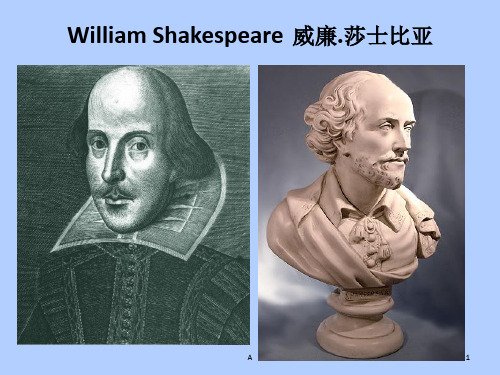
A
1
Who is Shakespeare?
A
2
艾汶河上斯特拉斯福:莎翁故居及塑像
A
3
莎翁部分作品:Some Works
A
4
Poems
• Poems: • I narrative: ballad, epic • II dramatic: dramatic monologue • III lyric (dealing with emotions, feelings): sonnet, ode,
happiness eyes
thine
yours the possessive pronoun
Verbs after second person subject should end with (e)st thou would(e)st thou hast thou wast thou didst thou singest thou growest
• The rhyme scheme is as follows: First stanza (quatrain): ABAB; Second stanza (quatrain): CDCD; Third stanza (quatrain): EFEF; Couplet: GG.
A
12
Early Modern English Grammar
A
11
Rime scheme
• Petrarchan (Italian) rime scheme: abba, abba, cd, cd, cd abba, abba, cde, cde
• The Shakespearean (English, or Elizabethan) sonnet is also called the English sonnet, with three four-line stanzas (quatrains) and a two-line unit called a couplet (对子).
莎士比亚爱情诗英文第18首十四行诗
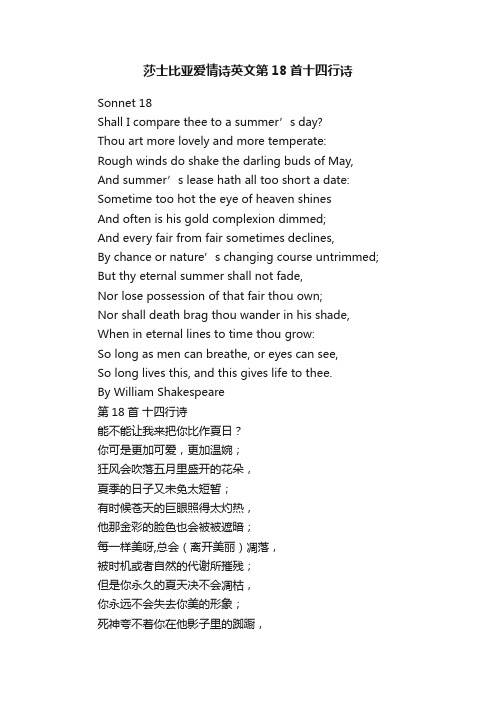
莎士比亚爱情诗英文第18首十四行诗Sonnet 18Shall I compare thee to a summer’s day?Thou art more lovely and more temperate: Rough winds do shake the darling buds of May, And summer’s lease hath all too short a date: Sometime too hot the eye of heaven shinesAnd often is his gold complexion dimmed;And every fair from fair sometimes declines,By chance or nature’s changing course untrimmed; But thy eternal summer shall not fade,Nor lose possession of that fair thou own;Nor shall death brag thou wander in his shade, When in eternal lines to time thou grow:So long as men can breathe, or eyes can see,So long lives this, and this gives life to thee.By William Shakespeare第18首十四行诗能不能让我来把你比作夏日?你可是更加可爱,更加温婉;狂风会吹落五月里盛开的花朵,夏季的日子又未免太短暂;有时候苍天的巨眼照得太灼热,他那金彩的脸色也会被被遮暗;每一样美呀,总会(离开美丽)凋落,被时机或者自然的代谢所摧残;但是你永久的夏天决不会凋枯,你永远不会失去你美的形象;死神夸不着你在他影子里的踟蹰,你将在不朽的诗中与时间同长;只要人类在呼吸,眼睛看得见,我这诗就活着,使你的生命绵延。
莎士比亚经典十四行诗附译文

莎士比亚经典十四行诗附译文莎士比亚十四行诗结构技巧和语言技巧都很高,每首诗都有独立的审美价值,让人沉醉于优美的文字当中。
下面是店铺为大家带来莎士比亚经典十四行诗附译文,希望大家喜欢!莎士比亚经典十四行诗一Love is too young to know what conscience is;Yet who knows not conscience is born of love?Then, gentle cheater, urge not my amiss,Lest guilty of my faults thy sweet self prove:For, thou betraying me, I do betrayMy nobler part to my gross body's treason;My soul doth tell my body that he mayTriumph in love; flesh stays no father reason;But, rising at thy name, doth point out theeAs his triumphant prize. Proud of this pride,He is contented thy poor drudge to be,To stand in thy affairs, fall by thy side.No want of conscience hold it that I callHer 'love' for whose dear love I rise and fall.莎士比亚经典十四行诗译文爱神太年轻,不懂得良心是什么;但谁不晓得良心是爱情所产?那么,好骗子,就别专找我的错,免得我的罪把温婉的你也牵连。
因为,你出卖了我,我的笨肉体又哄我出卖我更高贵的部分;我灵魂叮嘱我肉体,说它可以在爱情上胜利;肉体再不作声,一听见你的名字就马上指出你是它的胜利品;它趾高气扬,死心蹋地作你最鄙贱的家奴,任你颐指气使,或倒在你身旁。
莎士比亚经典十四行诗译文
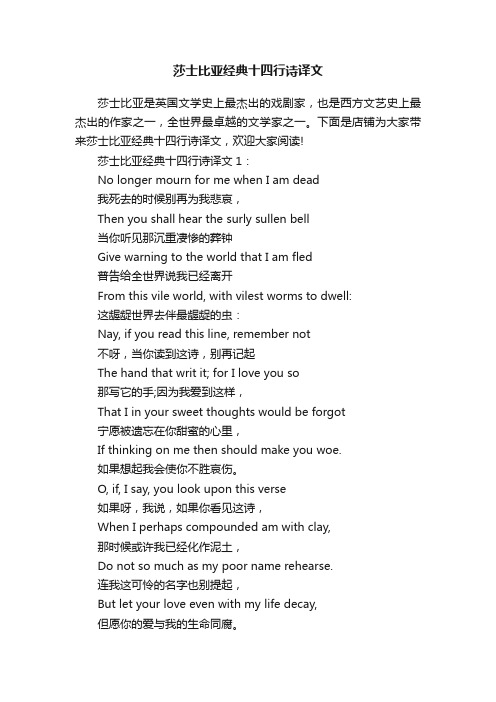
莎士比亚经典十四行诗译文莎士比亚是英国文学史上最杰出的戏剧家,也是西方文艺史上最杰出的作家之一,全世界最卓越的文学家之一。
下面是店铺为大家带来莎士比亚经典十四行诗译文,欢迎大家阅读!莎士比亚经典十四行诗译文1:No longer mourn for me when I am dead我死去的时候别再为我悲哀,Then you shall hear the surly sullen bell当你听见那沉重凄惨的葬钟Give warning to the world that I am fled普告给全世界说我已经离开From this vile world, with vilest worms to dwell:这龌龊世界去伴最龌龊的虫:Nay, if you read this line, remember not不呀,当你读到这诗,别再记起The hand that writ it; for I love you so那写它的手;因为我爱到这样,That I in your sweet thoughts would be forgot宁愿被遗忘在你甜蜜的心里,If thinking on me then should make you woe.如果想起我会使你不胜哀伤。
O, if, I say, you look upon this verse如果呀,我说,如果你看见这诗,When I perhaps compounded am with clay,那时候或许我已经化作泥土,Do not so much as my poor name rehearse.连我这可怜的名字也别提起,But let your love even with my life decay,但愿你的爱与我的生命同腐。
Lest the wise world should look into your moan 免得这聪明世界猜透你的心,And mock you with me after I am gone.在我死去后把你也当作笑柄。
莎士比亚十四行诗原文译文探析

莎士比亚十四行诗原文译文探析莎士比亚(William Shakespeare)是英国文学史上最伟大的剧作家之一,他的作品涵盖了多种题材和风格。
他的十四行诗被认为是他最具影响力的作品之一,也是他最著名的作品之一。
本文将探析几首莎士比亚的十四行诗的原文和译文,并对其进行解读和分析。
莎士比亚的十四行诗通常采用带有特定押韵格式的诗体,每行诗由十个音节(五对抑扬格)组成。
这种押韵格式被称为“莎士比亚诗体”或“英文十四行诗”。
莎士比亚的十四行诗主题涉及爱情、时间、美丽和死亡等广泛的话题,同时通过精炼的语言和演绎力强的形象描绘给读者深刻的印象。
首先让我们来看一首莎士比亚的十四行诗《当时所有最美丽的东西》,其原文如下:这首诗是莎士比亚的一首十分经典的爱情诗,表达了诗人对爱人美丽不朽的赞美。
诗中,诗人用夏日与爱人进行类比,并通过对夏日的描绘暗示出夏日的不完美与短暂。
与夏日相比,爱人的美丽更加温和和可贵。
诗人通过强烈的比较,表达了对爱人美丽的欣赏和爱恋的深度。
诗人还表达了对爱人不朽之美的赞赏。
诗中的“thy eternal summer shall not fade”表明爱人的美丽将永不褪色。
而最后两句“so long as men can breathe or eyes can see, so long lives this, and this gives life to thee.”则意味着这首诗将永远存在,并赋予了爱人永恒的生命。
下面是这首诗的中文译文:我可将你比喻为一个夏日吗?你比夏日更可爱、更温和:七月的风暴震动五月的爱芽,而夏日的租期太短暂:天空的眼睛有时炙热明亮,他的金色面容经常暗淡;美好婀娜终究会凋零,因时间流转,自然遗散;然而你永恒的夏天永不褪色,不失去拥有你这份美丽;死亡也别炫耀你走过阴影,因为你在永恒的诗歌里成长:只要人们呼吸、眼睛可见,它将长存,因它赋予你生命。
这个译文着重保持了原诗的意境和韵律,准确传达了原诗的主旨和情感。
莎士比亚经典十四行诗带翻译

莎士比亚经典十四行诗带翻译莎士比亚的十四行诗已令读者叹为观止,极大地影响了他那个时代甚至于如今的文人和文学爱好者,给人真、善、美的享受和心灵的启迪。
那么你想欣赏一下莎士比亚的经典十四行诗吗?下面是店铺为大家带来莎士比亚经典十四行诗带翻译,欢迎大家阅读!Ah! wherefore with infection should he live,唉,我的爱为什么要和臭腐同居,And with his presence grace impiety,把他的绰约的丰姿让人亵渎,That sin by him advantage should achieve以至罪恶得以和他结成伴侣,And lace itself with his society?涂上纯洁的外表来眩耀耳目?Why should false painting imitate his cheek骗人的脂粉为什么要替他写真,And steal dead seeing of his living hue?从他的奕奕神采偷取死形似?Why should poor beauty indirectly seek为什么,既然他是玫瑰花的真身,Roses of shadow, since his rose is true?可怜的美还要找玫瑰的影子?Why should he live, now Nature bankrupt is,为什么他得活着,当造化破了产,Beggar'd of blood to blush through lively veins?缺乏鲜血去灌注淡红的脉络?For she hath no excheckr now but his,因为造化现在只有他作富源,And, proud of many, lives upon his gains.自夸富有,却靠他的利润过活。
O, him she stores, to show what wealth she had 哦,她珍藏他,为使荒歉的今天In days long since, before these last so bad.认识从前曾有过怎样的丰年。
莎士比亚十四行诗带翻译

莎士比亚十四行诗带翻译莎士比亚的十四行诗语汇丰富、用词洗练、比喻新颖、结构巧妙、音调铿锵悦耳、张弛有度,让人印象深刻。
下面是店铺为大家带来莎士比亚十四行诗带翻译,供大家阅读欣赏!莎士比亚十四行诗1Then let not winter's ragged hand deface你还没提炼出香精,那你就别让In thee thy summer ere thou be distilled.严冬的粗手来抹掉你脸上的盛夏:Make sweet some vial; treasure thou some place你教玉瓶生香吧;用美的宝藏With beauty's treasure ere it be self-killed.使福地生光吧,趁它还没有自杀。
That use is not forbidden usury取这种重利并不是犯禁放高利贷,Which happies those that pay the willing loan;它能够教愿意还债的人们高兴;That's for thyself to breed another thee,这正是要你生出另一个你来,Or ten times happier be it ten for one.或高兴十倍,要是你一人生十人;Ten times thyself were happier than thou art,你十个儿女描画你十幅肖像,If ten of thine ten times refigured thee:你就要比你独个儿添十倍欢乐:Then what could death do if thou shouldst depart,你将来去世时,死神能把你怎样,Leaving thee living in posterity?既然在后代身上你永远存活?Be not self-willed, for thou art much too fair,别刚愎自用,你太美丽了,不应该To be death's conquest and make worms thine heir.让死神掳去、教蛆虫做你的后代。
- 1、下载文档前请自行甄别文档内容的完整性,平台不提供额外的编辑、内容补充、找答案等附加服务。
- 2、"仅部分预览"的文档,不可在线预览部分如存在完整性等问题,可反馈申请退款(可完整预览的文档不适用该条件!)。
- 3、如文档侵犯您的权益,请联系客服反馈,我们会尽快为您处理(人工客服工作时间:9:00-18:30)。
- a summer's day: In England, summer is not
hot but comfortably warm. It is the most
pleasant season of the year.
-temperate: gentle, soft, mild
温和的
英译: How can I compare you to a summer's day since you are lovelier and gentler than it?
c
And often is his gold complexion dimm'd ;
d
And every fair from fair sometime declines ,
c
By chance, or nature's changing course, untrimm'd . d
But thy eternal summer shall not fade,
a
Thou art more lovely and more temperate.
b
Rough winds do shake the darling buds of may,
a
And summer's lease hath all too short a date.
b
Sometime too hot the eye of heaven shines,
Modern English v.s. Middle English 现代英语和中古英语
? you ? You ( 宾格) ? your ? yours
? thine ? thou ? Thee ? Thy
? Roughwinds do shake thdearlingbuds of May, ? And Summer'lsease hathall too short daate.
Eluciddation ( 承c )
By chance, or nature's changing course, untrimm'd . d
But thy eternal summer shall not fade, Nor lose possession of that fair thou ow'st, Nor shall Death brag thou wander'st in his shade, When in eternal lines to time thou grow'st .
Sonnet 18
Definition of Sonnet
? A sonnet is a lyric, invariably, of fourteen lines, usually in iambic pentameter, restricted to a definite rhyme scheme.
e Tranfsition
( e转 ) f
So long as man can breathe or eyes can see, So long lives this, and this gives life to thee.
g
Conclusion
(g合 )
Appreciation
? Shall I compare thee tsouammer's d?ay ? Thou art more lovely and mteomreperat.e
e
Nor lose possession of that fair thou ow'st,
f
Nor shall Death brag thou wander'st in his shade,
e
When in eternal lines to time thoman can breathe or eyes can see,
? 十四行诗是一种有十四行诗句构成的抒情诗 体,用抑扬格五音步作全诗的形式,有固定 韵律。
Types of Sonnet
? There are three dominant types of sonnet, all named after their founders or perfecters (完善者):
? The rhyme scheme is abab cdcd efef gg.
? A theme is developed in the quatrains, and a concluding thought is presented in the couplet.
Sonnet 18
Shall I compare thee to a summer's day?
a
Introdubction ( 起a ) b
Sometime too hot the eye of heaven shines,
c
And often is his gold complexion dimm'd ; And every fair from fair sometime declines ,
Petrarchan sonnet 皮特拉克十四行诗 Spenserian sonnet 斯宾塞体十四行诗 Shakespearean sonnet 莎士比亚式十四
行诗
Shakespearian Sonnet
? Also known as the English Sonnet, consists of three quatrains(四行诗) followed by a couplet(对句) .
g
So long lives this, and this gives life to thee.
g
Sonnet 18
Shall I compare thee to a summer's day? Thou art more lovely and more temperate. Rough winds do shake the darling buds of may, And summer's lease hath all too short a date.
